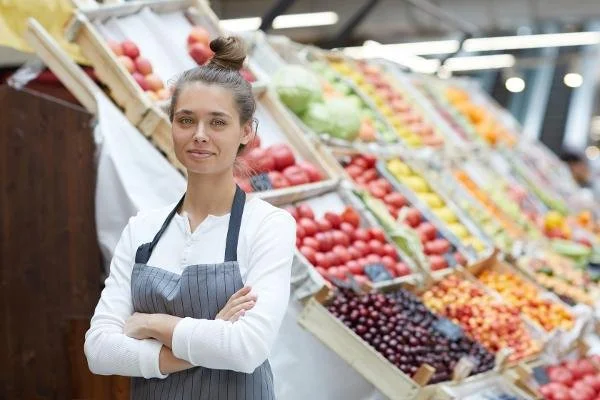Produce workers, also known as produce clerks, have the primary duty of keeping fruits, veggies, fungi and other produce ripe for the customer's picking. Besides the primary duty of a produce clerk, there are plenty of other tasks associated with the role. Duties that define a produce clerk job can vary from ensuring all produce is well stocked to cleaning up the onion bins. Below are some of the main tasks a produce clerk may be responsible for;
Monitoring Produce for Freshness
While many items in a grocery store have expiration dates, produce has a penchant for turning brown, ugly and undesirable in a shorter time frame than other products. Not only is that a turnoff for customers; it also provides a haven for fruit flies and other insects. An important part of a produce clerk's job description is to bear the responsibility of keeping an eye on and removing any produce that is not in an edible or presentable condition. Some stores may require you to notify a manager for produce that’s looking a little on the bad side or about to expire so he can reduce the price for a quick sale, while other stores simply toss the food in the garbage. Ideally, this second group would find alternative ways to repurpose fresh produce products and extend their shelf life. Keeping produce fresh as long as possible requires produce clerks to monitor temperatures of certain goods and appliances and log those temperatures throughout the day.
Stocking Produce and Maintaining Inventory
When the veggies, fruits, fungi and other produce start running low, produce clerks need to replenish the goods. You'll need to practice rotation when stocking, which calls for bringing older produce up to the front and placing newer produce in the back. Your employer may require you to prepare certain produce prior to stocking, such as coring pineapples and rinsing off veggies. Produce workers also need to keep an eye out for obviously damaged or rotten produce when stocking. You’ll likely find yourself involved in the stocking process from start to finish -- receiving the produce as a shipment and then unpacking and placing the produce in racks, bins, crates and shelves -- as a produce clerk. Some produce clerks also log inventory and change sales tags and displays as necessary.
Providing Customer Service
As a produce clerk, helping customers is paramount in the store’s produce sales numbers. Expect to point customers in the right direction, to help them find exactly what they’re looking for and answer any questions they have. You should have at least basic knowledge of common types of produce so you can answer specific questions about the produce your store sells and offer recommendations to customers. Not knowing that a customer means a parsnip when he asks for a white carrot, for instance, lessens your credibility.
Prepare Produce Samples
While bright red strawberries and ripe bushels of bananas may sell themselves, samples tend to give a little bump to the sales figures. Produce clerks may prepare samples and offer them to customers who walk by. Knowledge of what you’re sampling is vital. You need to explain what you’re sampling, why customers should taste it and why they should buy it, all in one or two sentences. Some stores delegate the preparation and offering of samples to employees other than produce clerks.
Perform Other Produce Clerk Duties
The produce department can become a messy place quickly. Additional produce clerk duties include sweeping and mopping the floor regularly to keep it free of debris that commonly falls from the produce, such as leaves, onion skins and stems. Racks, bins and shelves also need to be cleaned often.

